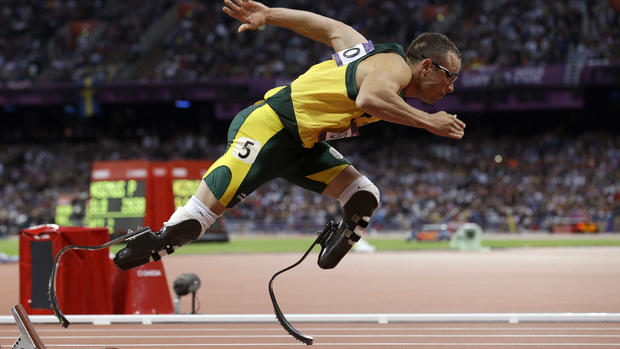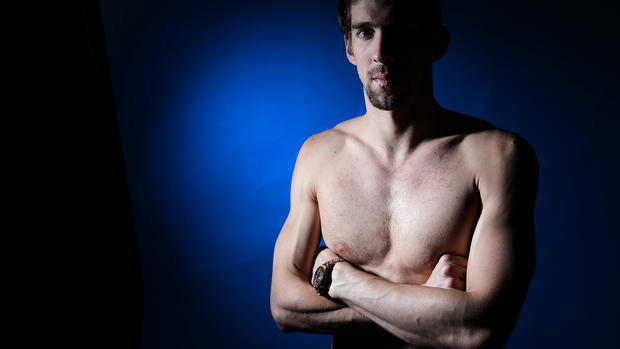Double-amputee Oscar Pistorius set for long-awaited Olympic debut
(AP) GEMONA, Italy - Even when he's looking at photos of his bleeding and blistered leg stumps, Oscar Pistorius smiles.
And with his Olympic debut approaching, it's easy to understand why.
The 25-year-old Pistorius, whose legs were amputated below the knee when he was a baby, is soon to make history by running, yes running, in the London Olympics. He will be the first amputee athlete to compete at the Olympics, but his journey to London has been long and filled with hurdles.
So when Pistorius finally got word this month that he had earned a spot on South Africa's Olympic team, he said his immediate reaction was to feel a sense of relief. What came after that was pure joy.
"I think I woke up the next morning with cramps in my cheeks. I was smiling in my sleep," Pistorius said in an interview with The Associated Press at his training base in northeastern Italy. "You also realize very quickly ... it's the London Olympics and I need to perform. Very stressful."
Double-amputee Oscar Pistorius to run in Olympics
Pistorius was born without fibula bones due to a congenital defect, and both his legs were amputated when he was 11 months old. His condition never stopped him from playing sports, and it was after injuring his knee while playing rugby as a teenager that he started to dream about running at the Olympics.
On Aug. 4, the opening day of the 400-meter heats, he'll get his chance.
"You've made the entrance to write the test, but now the test is in front of you," he said.
Pistorius runs with carbon-fiber blades attached to his legs, often causing him blisters and leaving his stumps raw from friction. The artificial appendages have earned him a nickname, "Blade Runner."
But those same prosthetics also led to years of controversy. Already a Paralympic gold medalist, Pistorius was initially banned from competing against able-bodied opposition because many argued that his blades gave him an unfair advantage.
In 2008, after extensive testing, the Court of Arbitration for Sport cleared him to compete. Last year, he ran on South Africa's 4x400 relay team at the world championships, but sat out the final. He still won a silver medal because he competed in the relay heats, but not everyone is convinced that he should be running next month in London.
"There will always be people who will debate and there will always be a journalist willing to write an opinion and a certain angle to a story," Pistorius said. "There will always be someone who wants to create a name for himself and if he's given that platform he'll take it and argue that wet is dry and green is red. There are always those types of people.
"One of the reasons for doing the tests was proving that I'm in a sport and have the ability to run due to my own talent and hard work and sacrifices and that was important for me. Looking back at that I'm happy that we went through it."
And with his competition status secured, some of his competitors are looking forward to racing against Pistorius.
"I've told him how much respect I have for him and the drive he has, to want to do something and take the action to work hard and get to where he wants to be," said LaShawn Merritt, the defending Olympic champion in the 400. "The dream of his was to be able to run with the able-bodied athletes and he knew what he had to do to make that happen, time-wise, and he worked his butt off to get it. He's here now."
To prepare for the biggest track meet of them all, Pistorius needed somewhere in Europe to train. So the mayor of Gemona, a small town near the Italian Alps and just across the mountains from Austria, built him one.
Running lap after lap on his Cheetah Flex-Foot blades, Pistorius has now set his mind on reaching the 400 semifinals - as he did at the worlds in South Korea last year. He's also hoping to run the sub 45-second time that he and his coach, Ampie Louw, are certain he can achieve. His best time so far is 45.07.
To reach his mark, there won't be any time to take it easy at the Olympics.
"We're going to race the heat. Oscar's got no choice," Louw said. "We must race the heat in order to proceed to the semis. We're going full out in the heats. No other way."
Pistorius' track in Italy is normally sun-drenched. But on this day, it's just drenched.
In pouring rain, Pistorius goes through his routine, then runs 150-meter splits. Louw whistles from the end of the home straight and he sets off, pounding around the bend and down the track. The water splashes out from under his blades.
Good preparation for London, his agent, Peet van Zyl, says with a smile.
Pistorius and his team have been based in Gemona for the last two European seasons after the mayor asked him if he'd consider training there to promote the town. Pistorius said he needed a track, ideally with the same Mondo surface as London's Olympic Stadium.
They built it for him.
So it's in the Italian town that Pistorius will put the final pieces in place for his high-profile - maybe the highest profile - debut at the Olympics.
"There's a big difference in qualifying for the games and being at the top," Pistorius said. "I'm going to go there to do my best and I'll be content if I can run close to my personal best, and hopefully a personal best. I'll go with my 'A' game and take my fight with me and see how well I'll do."
On Tuesday, Pistorius finished second in the 400 in his final warm-up race for the Olympics in Lignano, Italy. He finished in 46.56 seconds, well behind Calvin Smith of the United States in 45.52.
"My time wasn't among the best. But I'm good physically and mentally," Pistorius said after Tuesday's race. "I've used a lot of energy in these past few days, both in training and with the media because of my participation in the Olympics."
In his down time, he's already becoming a star.
At the small hotel in Gemona where he lives during the European season, Pistorius gets a lunchtime surprise when a cake with the five Olympic rings on it is given to him. The family which runs the hotel hug him and pose for photos in front of the cake. He calls them his adopted Italian family.
He smiles when he is given the cake. He smiles when he poses for pictures. He smiles when he talks about his hosts. He even smiles when showing pictures on his cellphone of his leg bleeding and raw after the recent African championships.
He'll almost certainly have a more serious expression on his face when he steps onto the track to run in London, but he'll surely be smiling all the way home after finally get the chance to achieve his Olympic dream.

